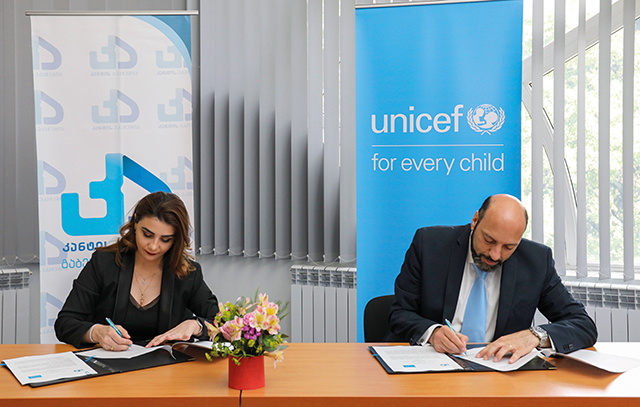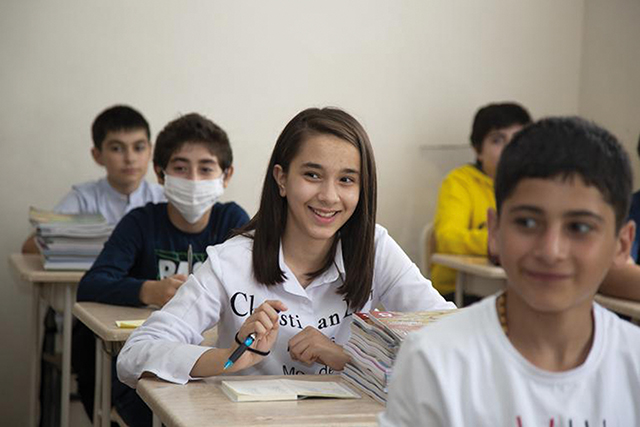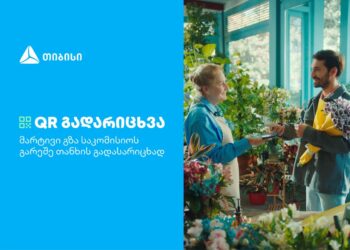UNICEF has been supporting the Government of Georgia for more than 20 years in realizing children’s rights and meeting its obligations under the Convention on the Rights of the Child. Its goal is to protect and foster greater social inclusion of the most vulnerable children and reduce disparities and inequities affecting children and their families.
They work with the government and civil society partners, as well as international development partners, to protect all vulnerable children from poverty, abuse, violence, exploitation and loss of family care.
They advocate for the reduction of child and maternal mortality, ending all forms of violence against children, improving social protection of children, prioritizing early child development, including pre-school education, improving general education with a focus on 21st century skills and competencies, ensuring family environment for every child, strengthening social inclusion of children living with disabilities and changing negative social norms and stereotypes.
In 2021, UNICEF Georgia started its new five-year country program that, among other priorities, will support the Government of Georgia to ensure that children, especially those who are most vulnerable, at risk or with disabilities, participate in educational programs that meet national quality and inclusiveness standards. It focuses on improving the capacity for (a) implementing national preschool standards and legislation in preschool institutions; (b) developing and implementing inclusive, student-centered and skills/competency-based general education policies and national curricula; and (c) rolling out nationally a set of successful piloted models for violence-free schools.
GEORGIA TODAY spoke to UNICEF – Georgia’s Communication Head, Maya Kurtsikidze, to find out more.
What education programs are ongoing and what challenges do they address?
Pre-school Education
Early childhood education is crucial for every child. As well as preparing children for primary education, good quality preschools help children navigate social relationships and find their place in the world. With the right resources – human and financial – a good preschool improves school readiness and thereby heightens a child’s chances of reaching their full potential. Investments in early childhood education enhance the health, well-being, learning and protection of young children, but the benefits go far beyond the individual child, to include economic growth, sustainable development and equal opportunities for all citizens.
Georgia faces challenges in this area, including relatively low levels of preschool participation among disadvantaged children, a lack of preschool teachers who are trained in modern, child-centered approaches, and limited investment in preschool education.
UNICEF prioritizes early childhood education in Georgia, working in close partnership with the government, municipalities and universities. Our advocacy is backed by the rigorous analysis of preschool access and quality that has revealed key gaps in both areas, and is enhanced by concrete examples of innovative approaches.
The Law on Early and Preschool Education and Care adopted by the Parliament of Georgia in June 2016 – developed with UNICEF’s technical support – includes innovations to improve quality, access and equity in early childhood education and care. One key innovation has been the introduction of mandatory national standards for all public and private preschool institutions, such as standards for teacher qualification, education process, sanitation, hygiene and nutrition. Every kindergarten must meet these new mandatory standards if it is to be authorized.
With support from the Government of Poland, UNICEF has supported the implementation of the new Law and standards in seven pilot municipalities across Georgia since 2018. In each case, UNICEF supported the development of comprehensive local strategies on training of preschool staff, including educators, administrators and others who work with children in pre-schools.
UNICEF has supported the Ministry of Education and Science in developing training modules, guidelines and visual resources to help preschool teachers put these standards into practice. Many preschool teachers do not have a relevant academic background, or may have been educated many years ago, when approaches to early childhood education and development were very different. We aim to help them catch up with the latest thinking and methods, which emphasize child-friendly, play-centered and culturally responsive techniques. UNICEF also intensified its partnerships with Georgian universities to develop and introduce the Bachelor degree programs to better train and equip future preschool teachers and managers.
We also work with municipalities to strengthen their capacity to implement the new standards, including ensuring sufficient pre-school places for all children as well as retraining and continuous professional development for all preschool personnel.
General Education
In general education, in partnership with the Government of Estonia, UNICEF has been supporting the Ministry of Education and Science of Georgia to build a highly skilled national teaching workforce, as well as to improve the quality of learning for children. The main components of the partnership included the revision and improvement of the National Curriculum, the introduction of Estonian teaching and learning methods in schools of Georgia, and the establishment of university training courses for Georgian educators.
In 2021, UNICEF Georgia started its new five-year country program that, among other priorities, will support the Government of Georgia to ensure that children, especially those who are most vulnerable, participate in educational programs that meet national quality and inclusiveness standards
The Georgia-Estonia-UNICEF partnership program in education has provided support to students and teachers to thrive in a fast-changing world of globalization and technological advancements by acquiring learning competencies that have become increasingly important in the 21st Century.
Curriculum revision
The National Curriculum for Grades 1-12 was revised with the support of Estonian educational experts in line with international and Estonian best practices, with the school system subsequently witnessing the introduction of new technology and innovative learning approaches.
Teacher capacity building
Along with the revision of the National Curriculum, teachers from 20 schools across the country went through training and studied innovative learning approaches. This included study visits of Georgian education practitioners to Estonia to observe and learn from the Estonian model first-hand.
The program continues and now includes 100 more public schools throughout Georgia, including remote and mountainous areas, and is focused on sharing the Estonian experience in distance teaching to contribute to the professional development of the educators. Elementary school teachers have been trained in competency-based teaching and learning methodology. Administrations of these schools, and representatives of local Education Resource Centers, have been trained in educational environments and school management. The participant schools will also be trained in the possibilities to create and maintain networks via different platforms to support dissemination and exchange of knowledge, practice and cooperation ideas.
Innovative teaching
The use of technology in the classroom has changed the way lessons are run in the 20 pilot schools of the program, but this also factors into the transformative process of Georgia’s educational system – student engagement and happiness.
Innovative teaching and learning resources have been developed, including a teacher’s guidebook on implementing the National Curriculum, as well as the ‘teacher in service’ training program, which entails ‘own-supervised coaching’. This entails post-training teachers being followed by educational experts and given guidance as they work. The training directive is already in use in the initial 20 pilot schools of the project.
The first national digital program for teaching and learning, ‘We Learn by Playing’, has been introduced. Highly appreciated by students, parents, and teachers, the program encourages creativity, independence, and team-work skills. Students and teachers are able to collectively and individually design and use digital lessons.
Although closure of kindergartens and schools at the start of the pandemic disrupted learning for 192,000 preschool and 592,000 school aged children, in 2021, a combination of online learning and physical attendance allowed children to return to school
A language immersion action plan was developed to support children from ethnic minority communities. These students are now able to study in both the language of the state and their mother tongue, with the action plan also assisting in the development of their social skills.
UNICEF, in partnership with the Ministry of Education and Science, Education for All Coalition and the International CK-12 Foundation, developed digital school textbooks for lower secondary grades in Science, Technology, Engineering and Math (STEM) subjects. Digitalization improves access of children and teachers to quality learning materials. Special attention was paid to building the capacity of teachers in the use of innovative approaches.

Higher education
Fully-fledged BA and MA programs were designed and introduced in eight Georgian state universities for pre-service training of prospective teachers to support their successful entry into the profession.
With the support of the Government of Norway, Child Rights Centers were established in nine state universities to serve as a resource hub and spread knowledge about child rights among different professionals, educators, academia, civil society organizations, parents and children. The Center will support future and current education specialists, parents and communities to better understand child rights. The Center will also organize various activities like trainings, open lectures and discussions, and develop the specific education materials on child rights.
Inclusive Education
In Georgia, there are many children, especially from the most socially and economically marginalized groups, who do not have access to compulsory education. Children who are either dropouts or at high risk of not being in school, include children with disabilities, children living and working on the streets, children from ethnic minority groups, children in public care, orphans, internally displaced persons, stateless children, refugees, and children from very remote areas.
UNICEF, with the financial support from the Bulgarian Government, supports the Ministry of Education and Science of Georgia in developing a systematic approach to addressing the challenges faced by out-of-school children and children at risk of dropping out of school.
Under the scope of this partnership, an adapted, two level catch-up and accelerated learning curriculum was developed with the support of national and international experts and in close cooperation with the Ministry of Education and Science. The adapted curriculum fully complies with the third generation National Curriculum and is tailored to the educational needs of out-of-school children as well as students at risk of dropping out.
The curriculum was piloted in 39 model schools and six day-care centers, with 189 schoolteachers, 25 special teachers, and 82 coaches trained and involved in piloting of the curriculum. Around 200 children, including out-of-school children and those at risk of school dropout, improved their literacy and numeracy skills, and some returned to school.
As 54,000 children do not have any access to either the internet or electronic devices to continue their education, a digital divide is enlarging for vulnerable children. Physical attendance remains the most desirable form of learning
Within the framework of the project, UNICEF promoted the integration of the adapted curriculum and inclusive education innovations into the syllabi of various subject areas of teacher pre-education programs in nine state universities. This initiative contributes to the preparation of qualified teachers who will have a solid understanding of the nature and importance of inclusive education and ensure effective teaching processes for out-of-school children.
The Ministry of Education and Science, with the support of UNICEF and the Norwegian Government, aims to strengthen the quality and inclusiveness of the national education system.
The program focuses on children between 3 – 18 years of age, with a specific emphasis on children with disabilities, national minorities, and marginalized children, including those who are currently not attending school and are at risk of dropping out. The program will support these children to receive an inclusive and quality education. In particular, effective teacher learning programs and supportive teaching and learning resources have been developed; training of resource school leaders, teachers, representatives of educational resource centres and local government members have been conducted; partner schools have provided children with after-school programs for learning, recreation, and supervised leisure; pre and in-service teacher training programs in universities and in the Teacher Professional Development Center have been strengthened to provide new teachers with adequate knowledge and skills; and stigma and harmful social norms against children with special educational needs and disabilities are being addressed. The project will last until 2024.
How has the pandemic affected Georgia’s education system, and what needs to be done?
Although closure of kindergartens and schools at the start of the pandemic disrupted learning for 192,000 preschool and 592,000 school aged children, in 2021, a combination of online learning and physical attendance allowed children to return to school.
UNICEF, the Ministry of Education and Science and the Georgian Coalition for Education for All, developed resources to promote early childhood development and school readiness at home after the closure of preschools in response to the Covid-19 pandemic. In partnership with the Public Broadcast Channel, 12 TV programs on ‘Recommendations for Parents’ were aired every weekend for six weeks. In addition, book-reading videos for young children and advice on how to support their holistic development were developed for the Ministry website, while printed brochures on simple tips and games to promote early childhood development, including in minority languages, were distributed to 300 socially vulnerable families. In all, 37,000 parents or caregivers were reached.
Following school closures due to the pandemic, UNICEF – Georgia launched a national back-to-school advocacy campaign which stressed the importance of school reopening, highlighting the negative impact that school closures have on children’s academic, social and mental wellbeing, and emphasizing the digital divide for children who lacked the necessary tools to engage in distance learning. The campaign combined extensive media engagement, field visits to schools and remote villages, a social media campaign, and government advocacy. The campaign also consisted of visiting schools while providing PPEs and activating advocacy messages on safe reopening.
The main components of the partnership included the revision and improvement of the National Curriculum, the introduction of Estonian teaching and learning methods in schools of Georgia, and the establishment of university training courses for Georgian educators
The Real Time Monitoring Survey conducted by the National Statistics Office together with UNICEF indicates that 55.5% of children age 2 to 4 years and 59.1% of children age 2 to 5 years attended early childhood education (ECD) from the beginning of the 2021 school year, a decrease from prior to the pandemic. As of October 2021, 74.1% of children age 6-17 years attended only classroom teaching, 13.6% only distance learning, 11.0% combined learning, while 1.3% did not attend the learning process at all. Children with disabilities are less likely to complete all education levels than children without disabilities.
As 54,000 children do not have any access to either the internet or electronic devices to continue their education, a digital divide is enlarging for vulnerable children. Physical attendance remains the most desirable form of learning.

UNICEF initiated an advocacy campaign aimed at reducing the digital divide, partnering with young people and educators in rural, hard-to-reach areas. Through hands-on skills building seminars about advocacy, by producing a number of personal stories about students and teachers, and by organizing roundtable meetings with local communities, UNICEF raised awareness on the urgency of equal access to quality internet. With the participation of young people, educators and government counterparts, UNICEF developed a new vision of school computer laboratory the main goal of which was to open the existing school labs for children not having access to internet and electronic devices. The new model of computer lab was piloted in three rural schools. The Ministry of Education and Science committed to integrate the new concept into their guidelines on organizing school spaces. The labs will provide children from vulnerable families with the opportunity to connect to the internet, to learn and to develop.
UNICEF will continue advocating for reducing the digital divide and increasing opportunities for children to access digital learning opportunities and resources. With all the education disruptions throughout the last two years, UNICEF will support various programs to increase learning opportunities, including strengthening implementation of the catch up and accelerated learning curriculum and the use of after-school programs to diversify learning opportunities for children. Moreover, UNICEF will continue to support the professional development of teachers so they are better equipped to support the various educational needs of students in an effort to improve learning and educational achievements.
Interview by Katie Ruth Davies














